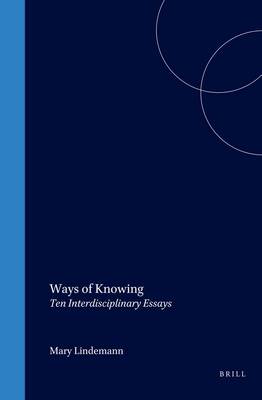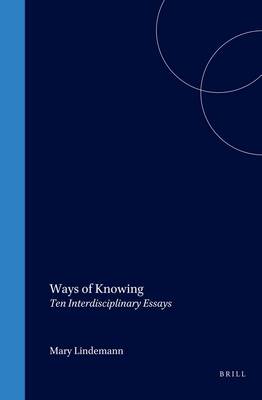
- Afhalen na 1 uur in een winkel met voorraad
- Gratis thuislevering in België vanaf € 30
- Ruim aanbod met 7 miljoen producten
- Afhalen na 1 uur in een winkel met voorraad
- Gratis thuislevering in België vanaf € 30
- Ruim aanbod met 7 miljoen producten
Zoeken
Ways of Knowing
Ten Interdisciplinary Essays
€ 245,95
+ 491 punten
Omschrijving
"Knowing" itself is a problematic concept and what was once seen as the clear objective of "knowing," that is to discover "truth" or "reality," has become increasingly less certain. This is even more the case when scholars move from the present to examine epistemology in the past. Two fundamental questions arise: What constituted knowledge in the context of early modern Germany and how was knowledge gathered, assembled, organized, deployed, and interpreted? Ways of Knowing seeks to answer these questions. Taking their cues from a range of interdisciplinary perspectives, including art, German literature, social, political, medical, and religious history, the contributors offer readers a rich and insightful portrait of knowing and knowledge in early modern Germany. Investigators look at what people "knew" in early modern Germany and how they "knew" it. Four essays in part one consider how knowledge was created and organized. In part two, six authors examine how knowledge was evaluated and how it functioned, especially in the realms of belief, law, politics, and medicine.
Contributors include: Robert Beachy, Susan R. Boettcher, Jason Coy, Pia F. Cuneo, Mitchell Lewis Hammond, Mary Lindemann, Francisca Loetz, Terence McIntosh, Janice L. Neri, Elisabeth Wåghäll Nivre, and Helen Watanabe-O'Kelly.
Contributors include: Robert Beachy, Susan R. Boettcher, Jason Coy, Pia F. Cuneo, Mitchell Lewis Hammond, Mary Lindemann, Francisca Loetz, Terence McIntosh, Janice L. Neri, Elisabeth Wåghäll Nivre, and Helen Watanabe-O'Kelly.
Specificaties
Betrokkenen
- Uitgeverij:
Inhoud
- Aantal bladzijden:
- 210
- Taal:
- Engels
- Reeks:
- Reeksnummer:
- nr. 31
Eigenschappen
- Productcode (EAN):
- 9780391041844
- Verschijningsdatum:
- 15/04/2004
- Uitvoering:
- Hardcover
- Formaat:
- Genaaid
- Afmetingen:
- 162 mm x 236 mm
- Gewicht:
- 530 g

Alleen bij Standaard Boekhandel
+ 491 punten op je klantenkaart van Standaard Boekhandel
Beoordelingen
We publiceren alleen reviews die voldoen aan de voorwaarden voor reviews. Bekijk onze voorwaarden voor reviews.







